Embarking on international travel requires careful planning, especially when it involves carrying prescription drugs across borders. Each country has its own regulations concerning the importation and use of medications, and what may be commonplace and over-the-counter in one country could be completely banned or require a prescription in another. Therefore, understanding these laws is crucial to avoid legal issues or difficulties with access to necessary medication while abroad.
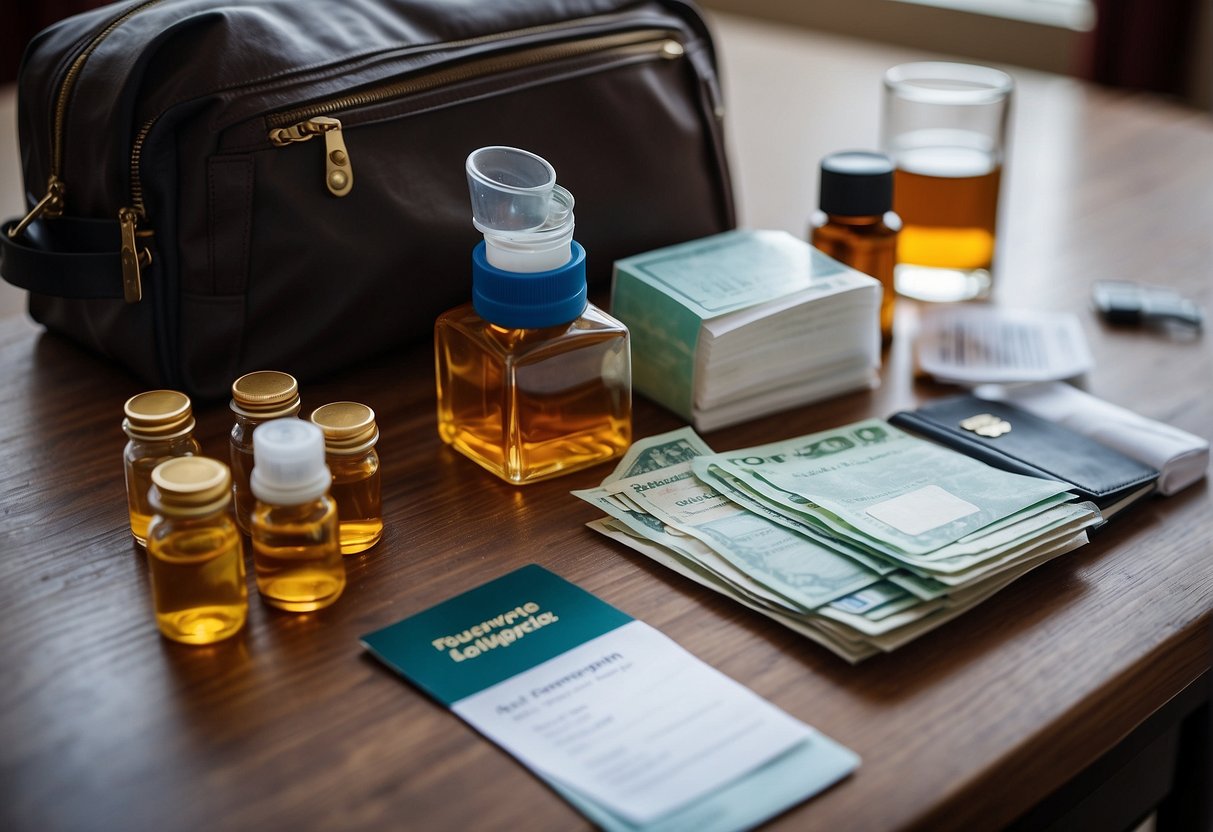
When preparing for travel with medications, individuals must ensure their medicines are clearly labeled, kept in original packaging, and accompanied by a doctor’s prescription. It is also important to consider the quantity of medication being carried to comply with limits imposed by destination countries. Thorough research about specific drug regulations in the destination country can prevent disruptions in treatment or complications with security and customs processes. Planning not only protects one’s health but also ensures compliance with international laws.
Key Takeaways
- Verify country-specific medication regulations before traveling.
- Carry medications in original packaging with a valid prescription.
- Research and plan for secure transportation and customs compliance.
Understanding International Travel Prescription Drug Regulations
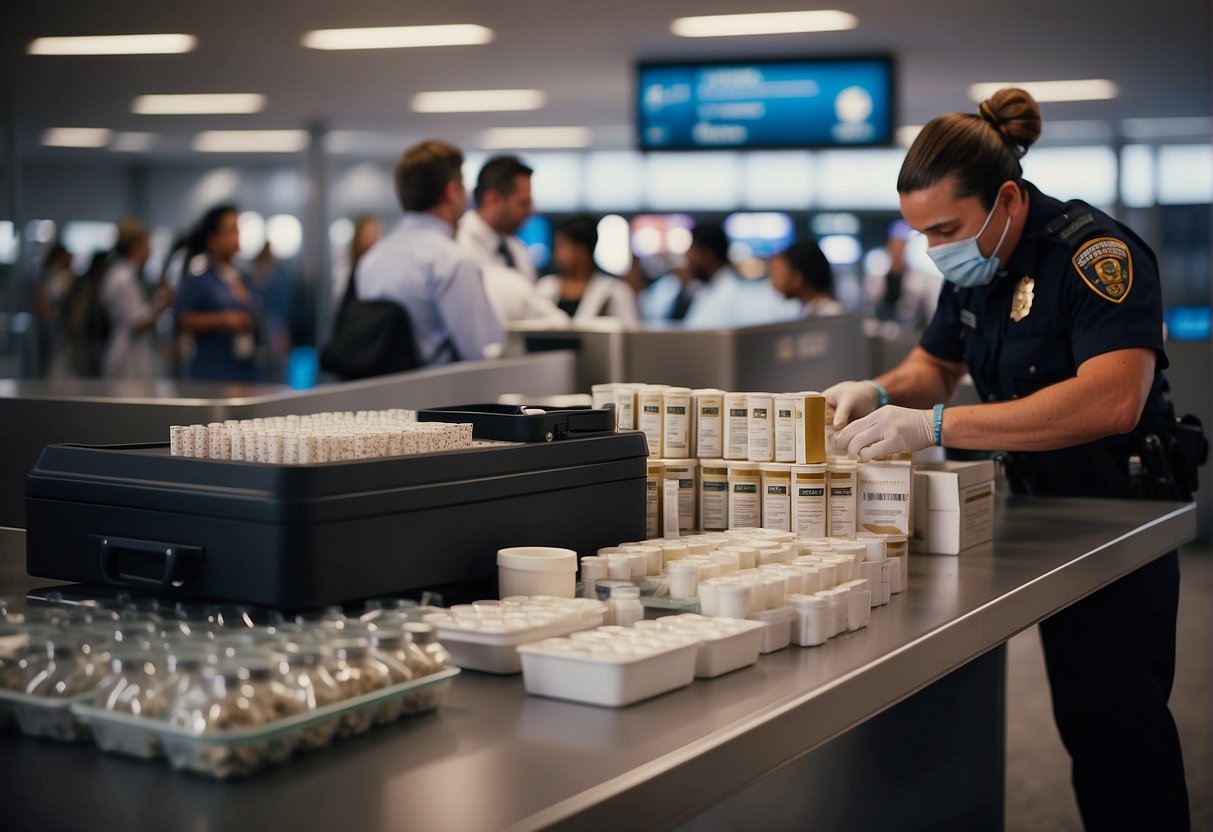
When traveling internationally with prescription medication, it’s crucial to be informed about the varying global laws and to transport your medication legally to avoid inconveniences or legal issues.
Global Prescription Drug Laws
Different countries have their own regulations regarding prescription medication. Travelers must check the specific medication laws for their destination country to ensure compliance. For example, a medication that is legal and available over-the-counter in one country could be classified as a controlled substance in another. Researching ahead can help in identifying whether any of your medications fall under illegal categories abroad.
- Checklist for Global Prescription Drug Laws Compliance:
- Verify the legal status of your medication in the destination country.
- Acquire necessary documentation, such as a prescription or medical certificate.
- Understand quantity restrictions for bringing medications into the country.
Transporting Medication Legally
Legal transportation of medications during international travel requires organizing and possibly presenting documentation at borders. Travelers should carry a copy of their original prescription or a letter from their healthcare provider that verifies their need for the medication. Some countries may also require medications to remain in their original labeled containers. If traveling with controlled substances, additional forms or permits may be necessary.
- Tips for Legally Transporting Medications:
- Prescriptions: Carry documents proving legal prescriptions.
- Original Packaging: Keep medications in their original labeled containers.
- Controlled Substances: Research and obtain any special permits required for these medications.
By adhering to these regulations, one can ensure a smoother travel experience while maintaining their health needs. For general guidance on traveling with prescription drugs, valuable insights can be found at international travel and prescription medications resources.
Preparing Your Medications for Travel
When traveling internationally with prescription drugs, take meticulous steps to ensure your medications are correctly documented and packed. Specific regulations must be followed, especially when it comes to controlled substances.
Documentation for Medications
It’s essential to have proper documentation for all prescription medicine. This includes a letter from your physician detailing your medical conditions and the medications prescribed, along with dosage instructions. Keep this documentation readily accessible, preferably in your carry-on bag. Ensuring that medications remain in their labeled containers can simplify security checks and customs screenings.
- Physician’s letter: Should detail medical condition and prescription.
- Prescription bottles: Must be correctly labeled with your name and dosage.
Packing Medications Appropriately
Medicines should always travel in their original container to avoid any confusion about their contents. For convenience and security, pack medications in your carry-on bag to prevent loss due to checked baggage delays. When packing liquids or gels, remember to comply with the TSA’s regulations on quantities allowed in your carry-on. Additionally, consider the storage needs of your medications, such as refrigeration requirements.
- Carry-on bag: Best for keeping essential medications with you.
- Original container: Helps identify the medication and ensures proper handling.
Carrying Controlled Substances
Carrying a controlled substance across borders requires particular attention. Ensure that you carry only the amount necessary for the duration of your trip, plus a little extra in case of travel delays. It’s advised to check with the embassy or consulate of your destination country regarding their regulations on the specific controlled substance you are carrying. Controlled substances should always remain in their prescription bottles and be accompanied by appropriate documentation.
- Controlled substance amount: Limit to what’s necessary for your trip duration.
- Prescription bottles: Required for authenticity and ease of verification.
For those packing for an international journey, obtaining updated information on packing prescriptions can offer peace of mind. Following these guidelines will help to ensure a smooth and hassle-free experience with your essential medications while abroad.
Health and Safety Considerations
While traveling internationally with prescription drugs, travelers must give meticulous attention to legal compliance, safe storage, and knowledge of how to navigate health systems abroad.
Managing Medication on the Move
Travelers should consult a travel health specialist before departure to ensure their medication complies with international laws and to obtain necessary immunizations. Medications should be kept in original packaging and accompanied by a prescription or doctor’s note, especially for substances that are controlled. If the medication requires refrigeration, proper portable options should be identified.
Accessing Healthcare Abroad
Patients should inform their insurance companies about travel plans as not all policies cover international healthcare. Purchasing travel insurance and travel medical insurance can provide additional security. This can be crucial for those participating in medical tourism or who may require healthcare during their journey. For over-the-counter needs, it’s important to recognize that some drugs have different legal statuses abroad.
Dealing with Emergencies
In an emergency, knowing where to access healthcare is paramount. Travelers should carry a list of local hospitals or clinics at their destination. It’s beneficial to learn basic phrases in the local language for health-related situations. Travelers can research international travel immunizations, should vaccinations be required during an emergency health situation.
Security and Customs Processes
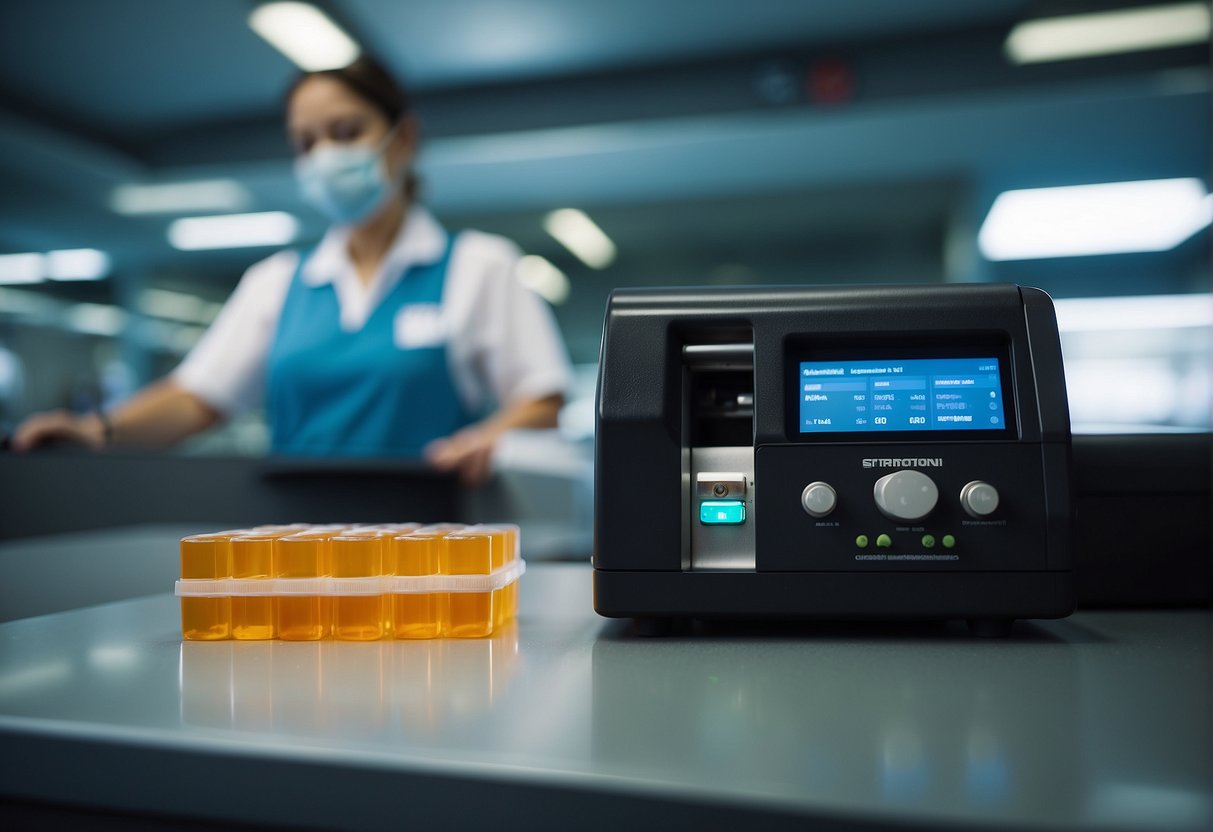
When traveling internationally with prescription drugs, it’s important to understand the security and customs processes that apply. These procedures ensure the safe and legal transport of medications across borders, both for the safety of the traveler and the integrity of global health standards.
Airport Security Measures
The Transportation Security Administration (TSA) has explicit guidelines for medications on a plane. Passengers are allowed to bring medically required liquids, including medications, in excess of 3.4 ounces or 100 milliliters in their carry-on bags. These are exempt from the international travel liquid limit, but passengers must declare them to security officers at the checkpoint for additional screening. It is recommended that medications be clearly labeled to facilitate the screening process.
Custom Declarations
Upon reaching their destination, travelers must be prepared for the customs process. Proper declaration of any prescription medication is mandatory. For specifics on what needs to be declared or if there are any restrictions, travelers can consult the international travel TSA guidelines. Passengers should be aware that some medications legal in one country may be prohibited in another, and it’s crucial to verify this information before traveling to avoid any legal complications at customs.
Legal and Insurance Information
When traveling abroad with prescription drugs, it’s crucial to understand the legal implications and how your insurance coverage may be affected. This section will guide you through the necessary steps to staying compliant with laws and maintaining access to your medication while away from home.
Understanding Your Insurance Coverage
Before departing, one should review their insurance policy to determine what is covered during international travel. Many health insurance plans provide limited coverage overseas, and it might be necessary to purchase additional travel health insurance to ensure coverage for prescriptions and medical care. Costs for medication, particularly with chronic conditions like coronary artery disease where nitroglycerin tablets and spray are routinely used for angina, can accumulate. Reviewing your policy helps anticipate any out-of-pocket expenses.
Navigating Travel with Controlled Medicine
Travelers must comply with laws governing controlled substances both at home and abroad. Coordination with a travel health specialist is advised to ensure proper documentation and legal transport of controlled medications. For those relying on medications for coronary artery disease, it should be clearly verified whether the nitroglycerin tablets and spray used for angina relief are subject to these regulations. Selecting the right international travel insurance policy is equally important to make sure these essential medications are covered and accessible during your travels without incurring significant out-of-pocket expenses.
Special Cases and Considerations
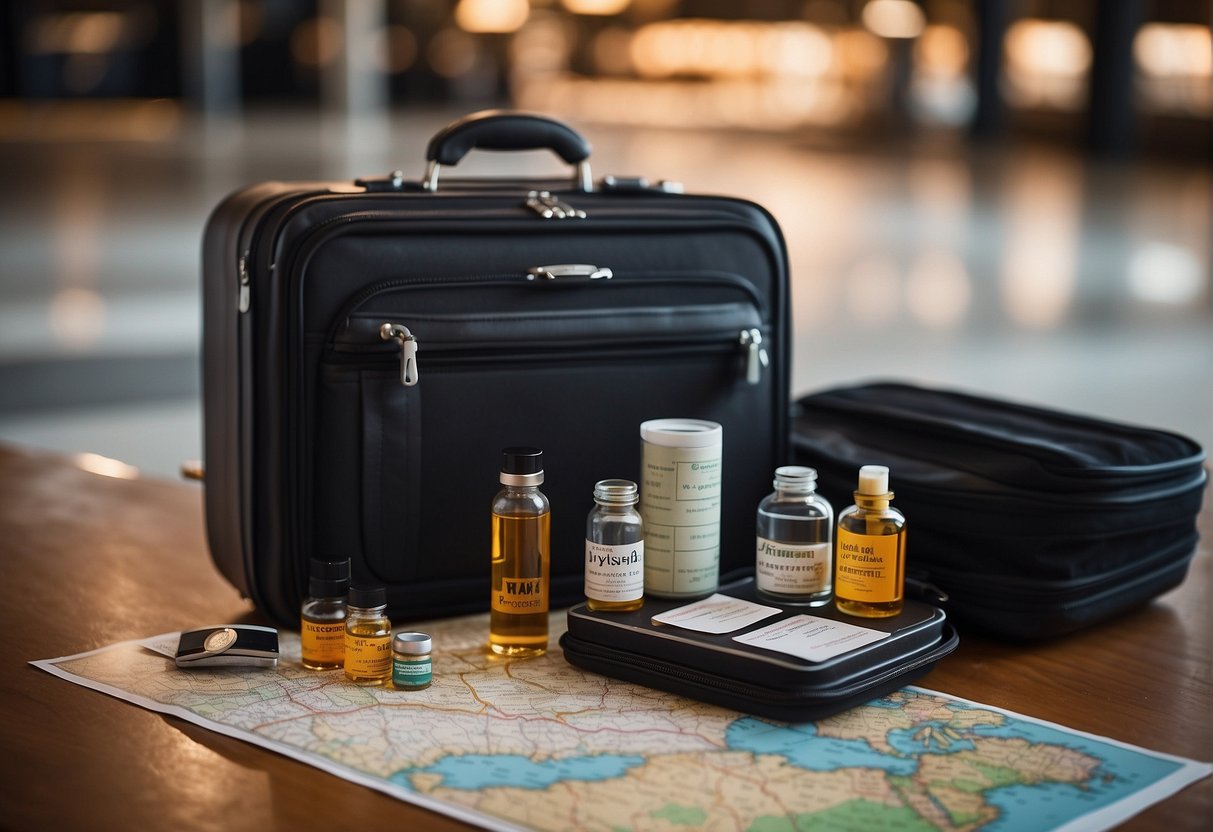
When traveling internationally with medication, passengers may encounter specific challenges related to carrying injectable medications and over-the-counter medicine. Different countries have varying regulations that could affect one’s ability to carry these items across borders. It’s crucial for travelers to be well-prepared and informed about these special cases.
Traveling with Injectable Medications
Injectable medications, such as insulin, require careful planning. Travelers must ensure they have adequate supplies and that their medications are stored correctly, often necessitating refrigeration. They should carry a doctor’s letter explaining the necessity of the injections and the syringes. Security personnel at airports are generally understanding when it comes to injectable medications, as long as they are clearly labeled and accompanied by a professional medical prescription.
- Storage: Medications requiring refrigeration may need a portable cooler with ice packs.
- Supplies: An adequate number of syringes should be packed, potentially more than the trip’s duration, to account for any unforeseen delays.
Medicines in injectable form can be subject to additional scrutiny, so keeping them in the original pharmacy packaging is advisable for smoother security checks.
Carrying Over-The-Counter Medicine International
When it comes to over-the-counter medicines, the distinction of what is considered over-the-counter in one country may not apply elsewhere. Some over-the-counter medications are deemed illegal or require a prescription in other countries. Carrying a small first-aid kit with essentials for emergencies is recommended; however, travelers should check the legality of these medications at their destination.
- Documentation: It’s always prudent to have a note from one’s healthcare provider for any medication, including over-the-counter drugs.
- Original Packaging: If the medicine is in pill or solid form, it should be kept in its original packaging, which includes dosage instructions and ingredients.
Travelers must be fully aware of these special conditions to avoid complications while ensuring their health needs are adequately met during their journey.
Country-Specific Guidance and Resources

When traveling internationally with prescription medications, it’s critical for travelers to navigate country-specific regulations and resources efficiently. Detailed research and preparation can prevent legal issues or access challenges when abroad.
Contacting Consulates and Embassies
Travelers should get in touch with the embassy or consulate of their destination country before traveling. These entities provide reliable information regarding the legality of specific medications in the country. They can also advise on import procedures and documentation necessary to carry medicines. An embassy or consulate has up-to-date knowledge about their country’s laws and can offer official guidance.
Key Steps for Contacting:
- Locate the nearest U.S. Embassy or consulate through their official website.
- Inquire specifically about medication importation rules.
- Request written confirmation, if possible, regarding the acceptability of your medications.
Utilizing Government Travel Resources
The Centers for Disease Control and Prevention (CDC) provides recommendations for traveling with medications. Their guidelines include keeping medicines in their original containers and bringing sufficient quantities for the trip duration, plus additional in case of delays. Travelers are advised to understand the generic names of their medications and carry a copy of their prescriptions.
Key Government Resources:
- CDC’s Travelers’ Health Page: Comprehensive health-related guidance, including packing tips for medications.
- Country Regulations for Travellers: A resource by INCB listing countries’ regulations about traveling with controlled substances.
Maintaining Medication Supply during Extended Travel
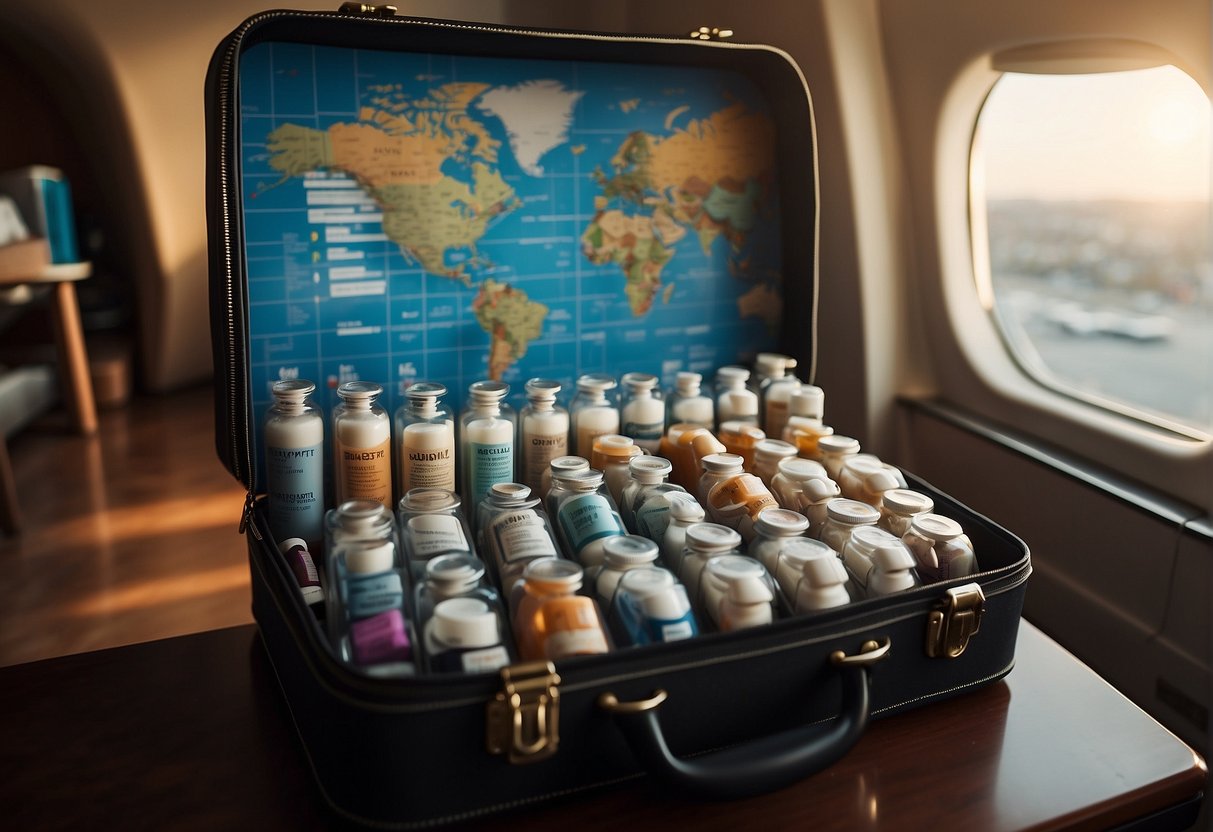
When traveling internationally for an extended period, travelers need to plan meticulously to maintain their medication supply. This includes understanding the processes for prescription refills abroad and preparing for potential medication shortages.
Prescription Refills Abroad
For individuals requiring prescription medication, it is advisable to bring a 90-day supply to avoid the need for refills abroad. However, should there be a need for a refill, one should first consult their health care provider before traveling. They can help with the appropriate documentation and advice for securing medication overseas. Travelers should be aware that FDA-approved medications might have different formulations or marketing names in other countries. It’s crucial to have the generic name of the medication for ease of reference and to check the legality of the medication in the destination country.
Handling Medication Shortages
In case of unexpected medication shortages while abroad, having contact information for local pharmacies and clinics can be vital. Travelers should carry a letter from their health care provider detailing their medical condition and required medications, which can be shown to a local doctor or pharmacist if necessary. Always keep medications in their original packaging, clearly labeled with the person’s name, prescription details, and dosage instructions to avoid confusion or issues with local authorities.
Adapting to Unforeseen Circumstances
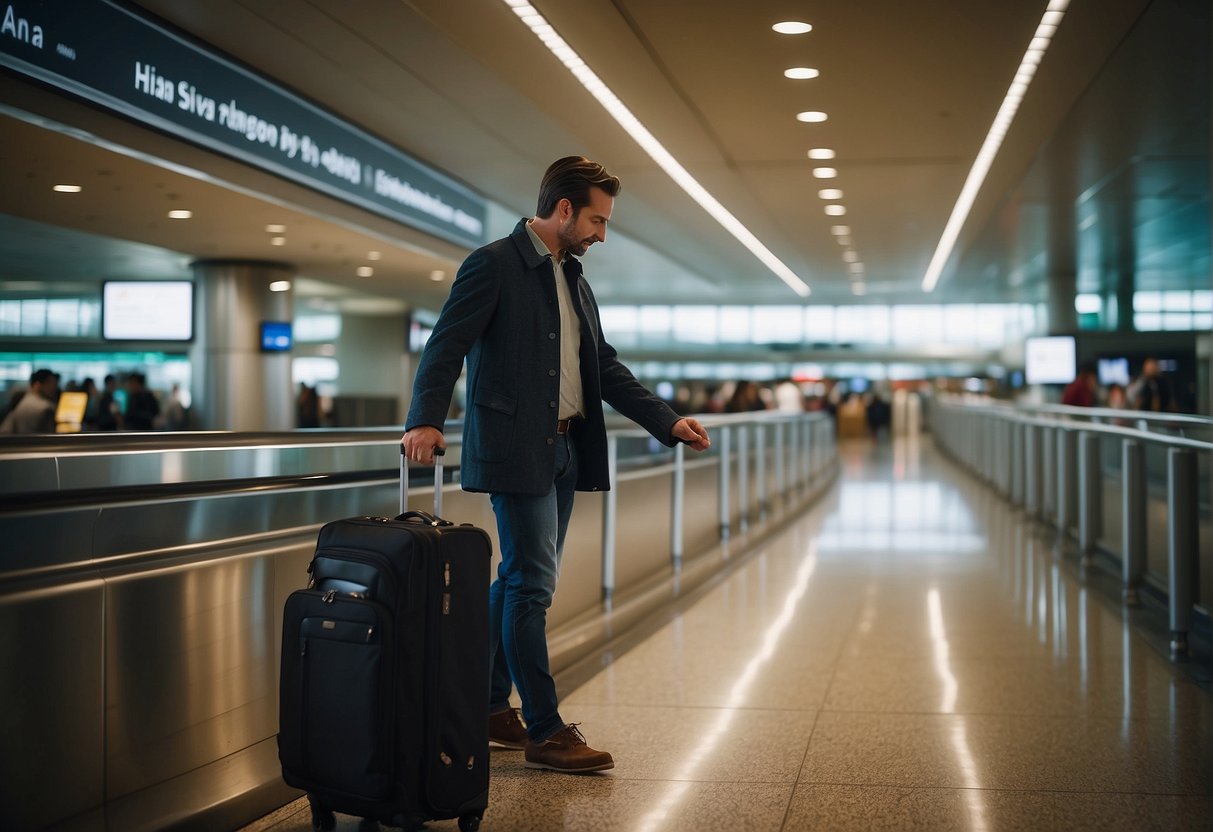
Travelers must always be prepared for the unexpected, especially with the persistent nature of the COVID-19 pandemic, which could impact travel plans without warning.
Covid-19 Considerations for Travelers
Navigating COVID-19 while planning international travel can be complex. Regulations may change suddenly due to outbreaks or new variants, necessitating a keen awareness and ability to adapt. Travelers should monitor international travel alerts for quick identification of new policies or restrictions that could affect their travel.
-
Check for Testing Requirements: Some destinations might require proof of a negative COVID-19 test. Travelers should confirm the type of test and the acceptable time frame prior to travel by consulting up-to-date information on COVID test for international travel.
-
Understand Quarantine Policies: Destinations could enforce quarantine upon arrival, especially if traveling from a region with high infection rates. This could extend the duration of your trip and requires being prepared for additional accommodation expenses.
-
Stay Updated on Destination Guidelines: COVID-19 response varies between countries. Those traveling to or through India, for example, must stay informed about the latest guidelines for international travel to India to ensure no last-minute surprises.
To mitigate the risks associated with COVID-19:
- Secure Travel Insurance: Opt for a plan that covers COVID-19 treatment and trip cancellations or interruptions.
- Pack Extra Medication: In case of quarantine or travel delays, having a surplus supply of any prescriptions is crucial.
- Maintain Flexible Itineraries: Be ready to adjust your plans swiftly as restrictions can change during your trip.
It is imperative for travelers to prepare adequately, stay informed, and adapt swiftly to changes triggered by COVID-19 to ensure a safe and successful journey.
Conclusion
Travelers should meticulously plan their medication management when preparing for international travel. Key considerations include:
- Ensuring an adequate supply of medication, accounting for potential travel delays.
- Keeping medications in original, labeled containers to avoid confusion or customs issues. Reference: Traveling Abroad with Medicine.
- Carrying a doctor’s letter and prescription copies as proof of medical necessity.
- Being aware of the active ingredients and correct dosages of their medications. Reference: How to Travel with Prescription Drugs Overseas.
Additional Tips:
- Pack medications in your carry-on luggage to prevent loss during transit.
- Be informed about the destination country’s regulations on medication to avoid legal complications.
Travel health advice is readily available and should be sought from healthcare professionals, such as pharmacists, who can provide comprehensive guidance on medication management abroad, vaccinations, and other health-related travel considerations. Reference: Pharmacy travel health services: current perspectives and future….
Travelers are advised to stay informed about health advisories for their destination countries and to visit a healthcare provider, ideally a travel medicine specialist, well in advance of their trip to address any concerns related to their medications and overall health.
Frequently Asked Questions

Travelers seeking to cross international borders with prescription medication must adhere to specific regulations to ensure a smooth journey. Below are several frequently asked questions that cover the essentials for managing medications while traveling abroad.
What are the requirements for carrying prescription medication during international flights?
Travelers must keep their medication in its original container, clearly labeled with a pharmacy label showing the prescription name. The Transportation Security Administration (TSA) suggests that prescription medications be clearly labeled to facilitate the screening process during security checks.
Is it necessary to have a doctor’s letter when travelling with medication?
A letter from a doctor explaining the necessity of the medication is not always mandatory but is highly advisable, especially if the medication falls under controlled substance categories or requires syringes and injections.
What precautions should be taken when packing a travel medicine kit for an international trip?
It is imperative to pack sufficient quantities of medication considering the trip duration and any potential delays. Medications should be stored in carry-on luggage to avoid the risk of loss and temperature changes in checked baggage.
How can I manage medication schedules across different time zones?
Travelers should create a plan for medication schedules across different time zones, aiming to maintain consistency in the timing of doses as close as possible to their usual routine.
Are there restrictions on certain prescription drugs in foreign countries?
Some prescription drugs legal in one’s home country may be restricted or even illegal in other countries. Travelers should verify the legality of their medications in their destination countries before departure.
How do international pharmacies handle prescriptions written by a foreign doctor?
While a foreign prescription may not be filled directly at international pharmacies, in emergencies, local doctors or clinics can often provide a corresponding prescription after an appropriate health evaluation.
Leave a Reply